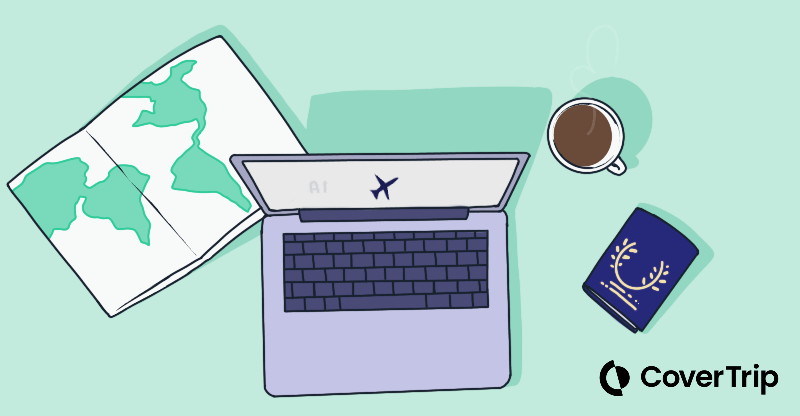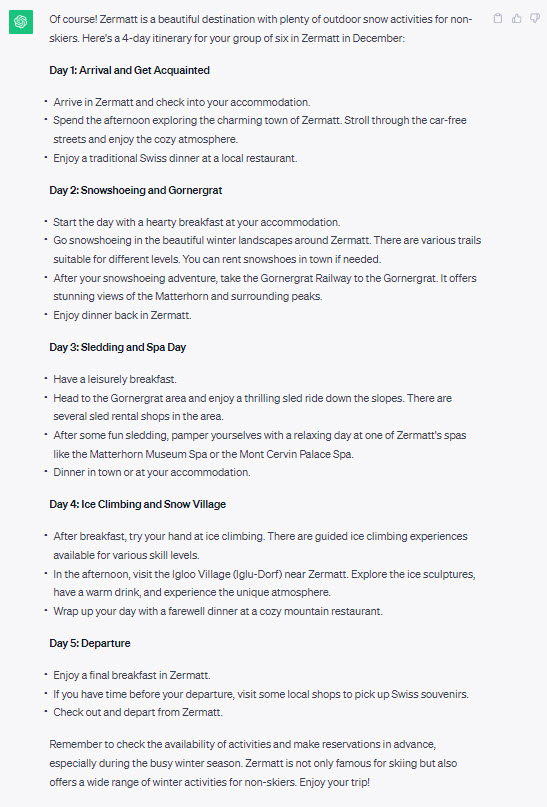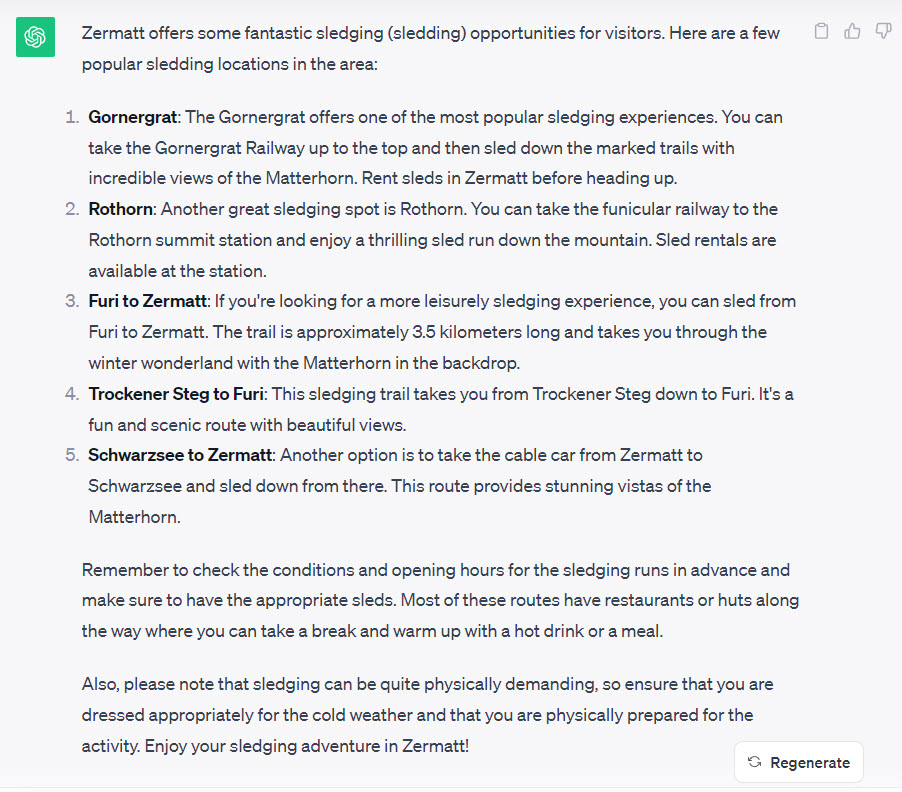How to use AI to plan your next trip
9 November 2023
It’s the early days of planning a trip, when you’re not sure where you want to go or what you want to do, that’s the sweet spot for using artificial intelligence to help with trip planning.
You can use AI in a conversational way and get personalized recommendations for all your travel questions. Using AI you can get extremely specific with exactly the type of trip you want to take.
And it’s very important to be specific when conversing with AI. The more detail you provide, the more specific the responses you’ll get.
Here’s are some things you will need to tell AI:
- The things you like to see and do
- The type of weather you enjoy
- The dates of your trip and how long you’ll be traveling
- How many people you’re traveling with
- Your travel budget
You should also include things you don’t want to do. I’ll show you an example in a minute.
For the purpose of this article, I used ChatGPT only, and I’ll explain why in a minute when I tell you about the mess that is currently going on with trip-planning AI tools. It’s not a pretty sight.
Still, AI can make a big difference when you’re planning a trip. It’s especially helpful when there are a lot of logistics, like multiple people with varying preferences on the same trip visiting more than one country. It hurts my brain to even think about that, and yet, I know six friends who are planning that exact trip this December. What a nightmare!
So, let’s learn how to use AI to make planning your next trip easier than ever!

5 Best Things to ask AI when trip planning
When planning a trip, here are five great things to ask your AI tool:
- Itinerary suggestions (see example)
- Packing lists
- Restaurant recommendations
- Lodging recommendations
- Exit and entry requirements (in fact, using AI can help you avoid scam visa websites pretty nicely)
Itinerary suggestions
One of the locations my friends are including in their December trip is Zermatt, so I fired up ChatGPT to see what it could provide in the way of itinerary suggestions.
Here’s an example (note the specificity):
I’d like some itinerary advice for a trip to Zermatt, Switzerland this December. I have a group of six people, three couples, spending 4 days there. They’d like suggestions for fun outdoor snow activities that are not skiing. Can you help?
Here’s a screenshot of what ChatGPT returned with that prompt:

Looks pretty good, right? Everything in that list of recommendations is snow- or ice-related, including the recommendation to warm up at a spa.
If you want some other ideas, just click Regenerate and you’ll get a different version of the itinerary.
You can also dive deeper into each of the recommendations with questions like, “Where can we go sledding?”

Huh, there’s a proper Swiss term for sledding. Pretty soon, you start to think of AI as your free travel agent … one with endless patience.
Other things you can ask AI
To be honest, the recommendations I’ve provided here only scrape the surface of the travel support AI can provide. Here’s a list of other uses for AI while traveling:
- Translations
- Currency conversions
- Weather forecasts
- Transportation options
- Local emergency phone numbers
- and pretty much everything else
And yet, AI has some big limitations that are important to understand.
Where AI fails travelers
So, here’s the thing, and you’ve probably heard it already. AI can’t think for itself. It can only respond to the queries you give it – that’s why I recommend being very specific and asking it follow-up questions to dive deeper into a topic.
AI is also not 100% accurate. It’s up to you to double-check the information it gives you. Plus, ChatGPT only has data up to 2021.
That means a list of restaurant recommendations may include restaurants that aren’t around any longer (asking for links in your query will help you with that second layer of research).
If you’re not specific with what you ask, AI will give you general recommendations (so would a live travel agent). For example, if you ask for restaurant recommendations but fail to include your dietary restrictions in the query, you may not be happy with the results.
This is good: What are the top three restaurants to try Swiss cuisine in Zermatt?
This is better: What are the top three restaurants to try Swiss cuisine in Zermatt? I’d like a place where locals go, not a chain restaurant. I’m also vegetarian. Please include links to each recommendation.
Which AI tool is best?
I used the free version of ChatGPT (download the app from your app store) for the research in this article, but there are new AI tools coming out every single day.
Researching travel planning AI tools gave me the impression that they’re just not quite there (yet).
For the most part, trip-planning AI bots are inaccurate, missing locations, and include too many ads (unless you want to pay) to be practical. For example, TripPlanner.ai doesn’t have all the locations in the world so it’s more limited than using ChatGPT. You can see a video review of TripPlanner.ai if you’re curious. I wasn’t impressed.
It’s early days and these tools will get better fast, so keep an eye on them.
Final word: AI vs Travel Agent/Planner?
Guess what? If you hire a travel planner these days, they’re likely using AI to find the answers.

There are even ways to build trip-planning apps without code knowledge. Scary, right?
If you’re a mature DIY traveler, you probably remember when we used to go to a bookstore to get a location-specific guide for our trips. Ahhh … the good old days.
Related topics
Damian Tysdal is the founder of CoverTrip, and is a licensed agent for travel insurance (MA 1883287). He believes travel insurance should be easier to understand, and started the first travel insurance blog in 2006.
